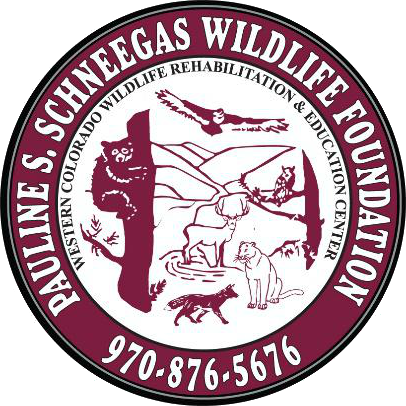I've found an animal...what do I do?
Please consult with a licensed wildlife rehabilitator, Colorado Parks and Wildlife (CPW) officer, or animal control officer before intervening!
Under Colorado law, it is illegal to possess any species of wildlife without a license. This is where licensed rehabilitators like us come in! In addition to being licensed to take care of wildlife, we have the ability to provide injured and orphaned wildlife with the best nutrition, appropriate medical care, and are usually able to pair them with their own kind so they can thrive and learn proper behaviors for their species.
It is legal, however, for the general public to capture an injured wild animal and transport it to a willing veterinarian, CPW, or licensed rehabilitator.
PSSWF is licensed to accept all species of wildlife except skunks and bats.
PLEASE DO NOT FEED ANY WILDLIFE UNLESS A REHABILITATOR INSTRUCTS YOU TO DO SO. online sites will give you diets to feed various wildlife, and many of these are extremely harmful! FEEDING WITH IMPROPER METHODS OR INAPPROPRIATE FOODS CAN LEAD TO THE DEATH OF THE ANIMAL.
If you have fed an animal before bringing it to us, please let us know so we can take appropriate measures on intake.
Does this animal need rescue?
If you have an animal you believe is in distress, don't hesitate to contact us for advice! Below are a few tips related to common animal calls.
BIRD HIT WINDOW
Unless the bird has an obvious broken wing or leg, or has blood coming from its beak or ears, it can sometimes be best to let the bird rest a few hours before deciding to take it to a rehabilitator. Oftentimes, if allowed a brief period of rest in a dark, quiet place, the bird will recover from its temporary head trauma and be able to fly off. If, after this time, the bird still hasn’t recovered, the best move is to get it to a rehabilitator.
BEARS
PSSWF can only accept bears that first come through Colorado Parks and Wildlife or another agency. If you feel that a bear needs help, feel free to call us for advice! You may find some of this information useful when determining whether or not the bear needs rescue:
Black bear cubs are born in late January while their mother is in hibernation. Though they usually stay with their mothers for a year and a half, when a healthy cub is six months old (i.e. after July), it is technically able to survive on its own without a mother. However, if the cub is injured or abnormally small and thin, it may need rescue.
Most bears start to hibernate at the end of October. If a bear or cub weighs less than 50 pounds at this time, its chances of surviving hibernation are low and it may need rescue.
MOUNTAIN LIONS
PSSWF is unable to accept lions unless they come through Colorado Parks and Wildlife or another agency first. If you feel that a lion needs help, feel free to call us for advice! You may find some of this information useful when determining whether or not the lion needs rescue:
Most mountain lions give birth during the late summer, but occasionally a female will have kittens in winter. If she is killed during winter (often during lion hunting season), her cubs will likely start to venture out of the den in search of food. If they still have their spots (which indicates they are less than six months old), they may need rescue.
ADULT DEER
Unfortunately, rescuing adult deer or elk with broken limbs is a very difficult task. Capture and restraint, even with tranquilization, often stresses the animal to death. As such, it is rarely possible to rehabilitate these animals. Often, the only solution is to humanely euthanize the animal or allow it to continue and hope that the wound heals on its own. If you see a deer or elk with a broken leg, feel free to contact us and we can advise you on the situation.
Capture
PSSWF is a volunteer-based organization and relies on the general public to capture and bring animals to us. We do have a small team of transport volunteers that can sometime assist with getting an animal to us.
If you are certain that the animal needs rescue, please contact your local wildlife rehabilitator for assistance and advice and follow these guidelines:
If you can safely catch the animal and get it in a kennel, crate, or box, place it in a dark, quiet area until you are able to contact us. Please keep your own safety in mind - beware of teeth, claws, beaks, and talons!
If you are unable to catch the animal, you may try to herd it into a yard or some other area it cannot get out of until we, or another wildlife service, can arrive. It’s best for injured animals to be out of direct sunlight, severe weather, and away from pets and roads while they wait for rescue.
Once caught, it is important to get the animal to a rehabilitator as soon as possible - wild animals stress easily. Keep the animal in a quiet, safe place away from predators, direct sun, and bad weather until you can get it to your nearest rehab facility.
Useful Contacts:
PSSWF
(970) 96-6895 (call or text)
psswildlifefoundation@gmail.com
Pitkin County Animal Control Dispatch
970-920-5300
CPW - Canyon Creek Office
(970)-947-2920
CPW - Grand Junction Office
(970) 255-6100
CPW - Meeker Office
(970) 878-6090
CPW - Hot Sulphur Springs Office
(970) 725-6200

